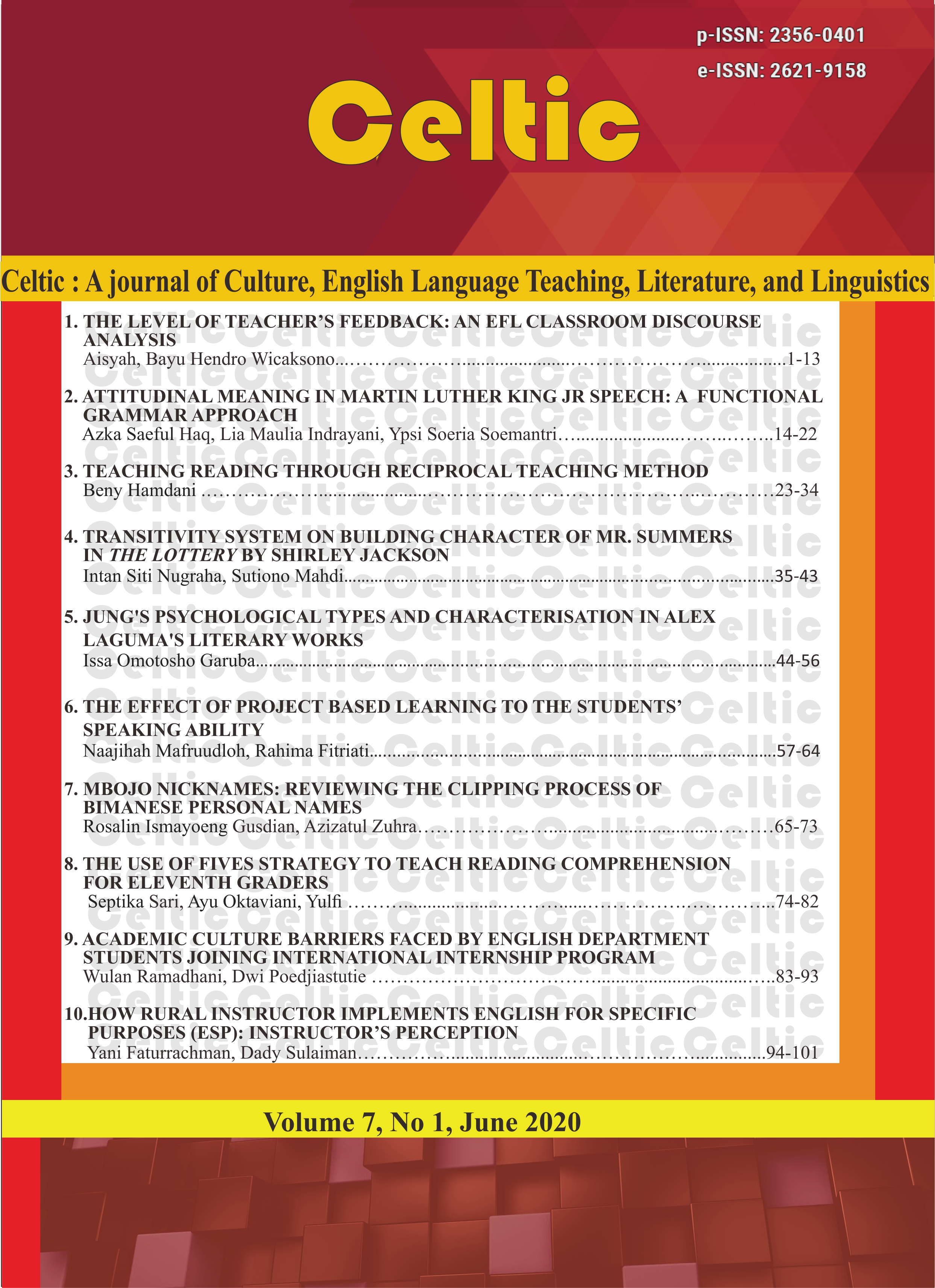HOW RURAL INSTRUCTOR IMPLEMENTS ENGLISH FOR SPECIFIC PURPOSES (ESP): INSTRUCTOR’S PERCEPTION
DOI:
https://doi.org/10.22219/celtic.v7i1.9937Keywords:
ESP, Perception, Teaching PlanAbstract
Teaching ESP is necessary to be designed by the ESP instructors because one of the teaching ESP requirements is the instructors must prepare the suitable precision of English materials for the ESP students. Hyland (2008:113) states that “designing lesson plan is one of the performing abilities to describe the instructors’ beliefs, interest, and values of the students’ needs about teaching, language, and language”. From several chronological descriptions, the researcher conveys that he applies the qualitative study as his approach to the study. As follows; (1) semi-structured interview, (2) nonparticipant observation, and (3) documentation. Indeed, the three techniques mostly are usually used by the researcher in order to cover the completely problematical statements in this study. The data were gathered by employing semi structured interview which were like the ESP instructors’ perception, opinion, and assumption. The result of data indicated that there were several the fact assumptions that the ESP instructors were mostly always implementing the suitable lesson for teaching which were; (1) doing the needs analysis, (2) setting the instructional goals, (3) selecting the materials, (4) selecting the teaching techniques, (5) preparing the teaching media, (6) doing the teaching activities, and (7) adapting the learning sources. Furthermore, the semi structured interview showed that the ESP instructors have described the chronological problems and solutions when they have designed and implemented lesson plan such as; The problems in selecting the properly real ESP material, in order to solve that the ESP instructors proposed the phenomenal perception that they mostly used the communicative language teaching to encounter the fact problems. Finally, the purpose of this study is to develop the way ESP instructors can evaluate their teaching application and learning process so that they can change their perception in implementing a teaching plan.
Downloads
References
Almabekova. O. A. (2010). Refelective Teaching ESP. Journal of Siberian Federal University. Humanities & Social Sciences 3 (2010 3) 462-475. Siberian Federal University.
Basturkmen, H. (2010). Developing Courses in English for Specific Purposes: Palgrave MacMillan: University of Auckland. New Zealand.
Bogdan, R. C, and Biklen, S. K. (2013). Qualitative Research Design for Education: an Introduction to Theory and Methods, fifth Edition: USA. Pearson Education, Inc. (p.107-153).
Chang. Y-J. Liu, J-Y. Yang, F-Y. and Sun, Y-C. (2013). Is what I need what I want? Reconceptualising college students’ needs in English courses for general and specific/academic purposes. Journal of English for Academic Purposes 271–280. Department of Foreign Languages and Literature, National Tsing Hua University, No. 101., Section 2, Kuang-Fu Road, HsinChu City 300, Taiwan, ROC.
Coanca. M. (2013). New Approach in Teaching ESP. Conference proceedings of eLearning and Software for Education" (eLSE)), issue: 02 / 2013, pages: 464469. Romanian-American University, Bucharest, Romania. accessed on March 27th, 2016, at 7.47 p.m.
Creswell, J. W. (2012). Educational Research: Planning, Conducting, and Evaluating Quantitative and Qualitative, 4th Edition: New York. Pearson Education Inc. (p. 212-224).
Creswell, J. W. (2014). Research Design: Qualitative, Quantitative, and Mix Methods approaches, Fourth Edition: London. LA. USA: Sage Publication, Inc. (p.234).
Fiorito, L. (2005). Teaching English for Specific Purposes (ESP). ESP Journal. University of Naples.
Fraenkle, J.R, Wallen, N.E, and Hyun, H.H. (2012). How to Design and Evaluate Research in Education, 8th Edition: New York. McGraw-Hill Companies. (p.446).
Hutchinson, T. and Waters, A. (1990). “English for specific purposes”, Cambridge University Press.
Harmer, J. (2012). Essential Teacher Knowledge: Core Concepts in English Language Teaching. England and Associated Companies throughout the World. Pearson Education Limited. (P.134-136).
Hoa, N. T. T, and Mai, P. T. T. (2016). Difficulties in Teaching English for Specific Purposes: Empirical Study at Vietnam Universities: Published by Canadian Center of Science and Education. Higher Education Studies; Vol. 6, No. 2; 2016 ISSN 1925-4741 E-ISSN 1925-475X. Vietnam National University.
Jeczelewski, S. (2016). Needs Analysis, Course Design and Evaluation of Business English B.A. Essay Kt.: 110593-3179. University of Iceland School of Humanities Department of English.
Leedy, and Omrod. (2010). Practical Research Planning and Research: USA. Pearson Education Inc. (p.94).
Maulidiyah, N. (2015). Developing English Material for Library Science students of Terbiyah and teachers training faculty of IAIN Antasari. Thesis Published. IAIN Antasari. Banjarmasin.
Downloads
Published
How to Cite
Issue
Section
License
- Authors retain copyright to publish without restrictions and grant the journal right of first publication with the work simultaneously licensed under a Creative Commons Attribution License that allows others to share the work with an acknowledgement of the work's authorship and initial publication in this journal.
- Authors are able to enter into separate, additional contractual arrangements for the non-exclusive distribution of the journal's published version of the work (e.g., post it to an institutional repository or publish it in a book), with an acknowledgement of its initial publication in this journal.
- Authors are permitted and encouraged to post their work online (e.g., in institutional repositories or on their website) prior to and during the submission process, as it can lead to productive exchanges, as well as earlier and greater citation of published work.














